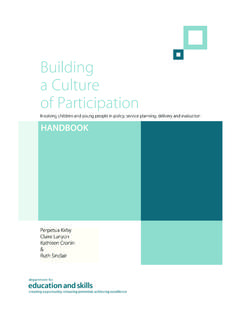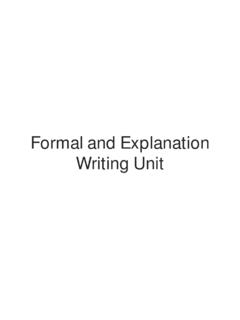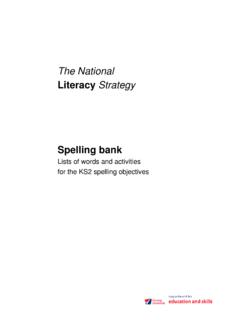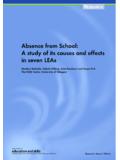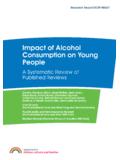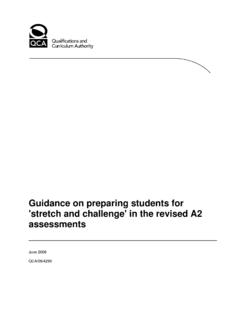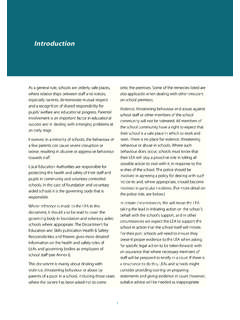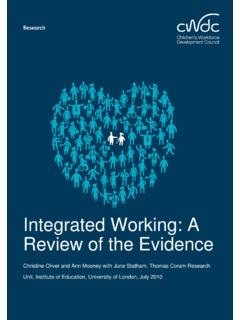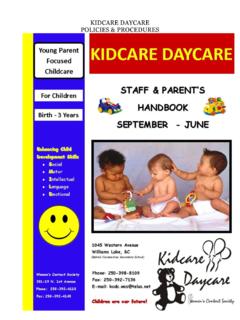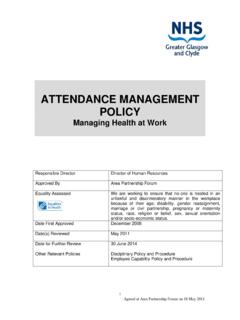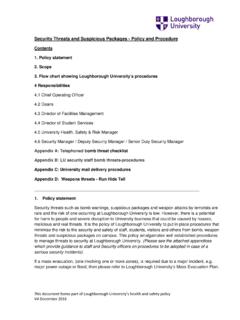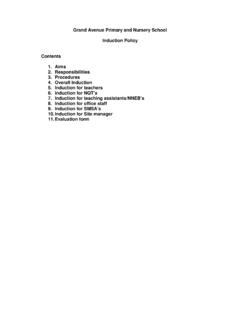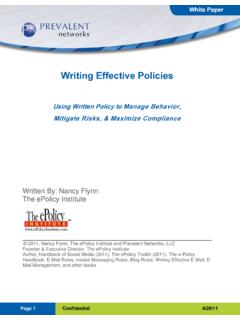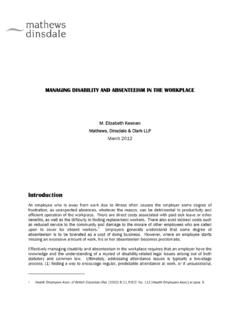Transcription of Toolkit unit 3 - UCL Institute of Education
1 Key Stage 3 National StrategyBehaviour and attendance StrandToolkit unit 3 Dealing with consistently poorbehaviourRef: DfES 1262-2005 Crown copyright 2005 Toolkit unit 3 Dealing with consistently poor behaviour3 ContentsOverview5 Introduction7 Section 1 Analysing causal factors underlying consistently poor behaviour9 Activity factors (1)Analysing the causes of poor behaviour and considering what theschool can do to promote access to learning9 Activity factors (2) Emotional health and well-beingReviewing perceived causes of poor behaviour10 Activity behavioursConsidering the effects of labelling behaviours on school action12 Resources14 Section 2 Applying existing strategies effectively19 Activity reviewConsidering how effective the school policy is for individual cases19 Activity of staff skillsConsidering staff as role models20 Activity support to colleaguesReviewing the process for handling incidents and the effect this has on the emotional health and
2 Well-being of staff22 Resources24 Section 3 Learning support units (LSUs)27 Activity programmesConsidering the benefits of specific programmes for individual needs28 Activity programmesReviewing LSUs and their suitability for your school29 Activity an alternative programmeConsidering the practical arrangements30 Resources32 Ref: DfES 1262-2005 Crown copyright 2005 Toolkit unit 3 Dealing with consistently poor behaviour4 Ref: DfES 1262-2005 Crown copyright 2005 Toolkit unit 3 Dealing with consistently poor behaviour5 OverviewTitleDealing with consistently poor behaviourAudienceBehaviour and attendance consultants with senior staff in school, behaviourand attendance leaders or lead behaviour professionals, mediated by behaviourand attendance senior staff to adapt material as part of a flexible training programme, includingself-study.
3 The programme should ensure that staff know, understand and haveaccess to a range of strategies for dealing with consistently poor behaviour whichfocus on improving behaviour and attendance and subsequently useThe behaviour and attendance leader or other member of the senior leadershipteam (SLT) can use this Toolkit unit to: consider the causal factors of consistently poor behaviour; review current policy and practice; identify and share good practice; consider the benefits of targeted can be measured by: the development of a common understanding across all staff of whatconstitutes consistently poor behaviour; a well-documented and clear system readily understood by parents/carers; a clear procedure understood by all staff and pupils and applied consistently; effective use of de-escalation procedures; reduction in serious incidents occurring; effective reintegration of pupils into class after serious incidents.
4 All incidents concluded and parents/carers notified in line with school to otherToolkit units 1: Leadership and management; 2: Everyday policies: rewards, toolkitunitssanctions and promotion of positive behaviour; 5: Pupil support systems;6: Classroom behaviour; 7: Out-of-class behaviour; 8: Curriculum; 9: AttendanceReferences to Behaviour and attendance training materials: Core day 1 Advice on other resourceswhole-school behaviour and attendance policy(DfES 0392-2003 R)Behaviour and attendance training materials: Core day 2 Developing effectivepractice across the school to promote positive behaviour and attendance (DfES0055-2004 R)Behaviour and attendance training materials.
5 Core day 3 Monitoring whole-school practice to promote positive behaviour and attendance (DfES 0020-2004 R)Behaviour and attendance training materials: Core day 4 Developing emotionalhealth and well-being: a whole-school approach to improving behaviour andattendance(DfES 0182-2005 R)DfES Advice on whole-school behaviour and attendance policy(DfES 0628-2003 R)DfES The behaviour and attendance audit for secondary and middle schools(DfES0392-2003 R)DfES Behaviour and attendance : in-depth audit for secondary and middle schools(DfES 0207-2003 R)Maslow, A.
6 H.(1954) Motivation and Personality, Harper & Row, New YorkNHSS (2004) Promoting emotional health and well-being,ISBN 1-84279-263-6 Ref: DfES 1262-2005 Crown copyright 2005 Toolkit unit 3 Dealing with consistently poor behaviour6 National Programme for Specialist Leaders of Behaviour and attendance (NPSL BA) Module BO Connor, J. and Seymour, J. (1998) Introducing NLP: Neuro-linguistic programming,HarperCollins, ISBN : DfES 1262-2005 Crown copyright 2005 Toolkit unit 3 Dealing with consistently poor behaviour7 IntroductionThis Toolkit unit is intended for use by behaviour and attendance consultants, working withbehaviour and attendance leaders in school, to construct a training programme that will help theschool to organise and implement improvements supporting various staff are three sections in this Toolkit unit.
7 Each section, with its associated activities andresources, is self-contained. Schools can select the most relevant activities and accompanyingtexts to form the core of a targeted programme that will address key issues emerging from anaudit and identified in the post-audit action and attendance leaders in the school may want to select the most relevant activitiesand accompanying texts to form the core of a targeted programme to address the key issuesabout consistently poor behaviour emerging from the audit, and identified in the post-audit action poor behaviour may present as low-level and wearing, and may or may not escalatein intensity and seriousness.
8 However, the persistent nature of generally poor behaviour can havea negative effect on the morale of both staff and pupils. This kind of behaviour provides barriersto learning and achievement and provides the focus for sections 1 and 2 of this Toolkit 3 provides guidance for schools in dealing with those pupils whose behaviour hasescalated beyond low-level with higher rates of exclusion and absence tend to have lower levels of attainment. Insuch schools: staff may lose confidence in dealing with pupils who have consistently poor behaviour, andmay feel unsupported by the school s systems; lack of communication between staff, pupils and parents/carers may inhibit the sharing ofsolutions to behaviour and attendance problems; staff may not have shared their understanding of what constitutes consistently poorbehaviour and of the causal factors underlying that behaviour.
9 Staff frequently use referral for support, and that support is targeted at addressing thesymptoms and not the causal factors of consistently poor audit suggests schools aim for: a common understanding across all staff of what constitutes poor behaviour; a well-documented and clear system readily understood by parents/carers; a clear procedure understood by all staff and pupils and applied consistently; staff confident in the de-escalation procedures; good strategies for reintegrating pupils into class after serious incidents; pupils who know what their roles and responsibilities are, to remain outside theincident and not inflame the situation, to locate senior staff when asked; use of appropriate language at the time of referral and re-entry.
10 All incidents concluded and parents/carers notified in line with school : DfES 1262-2005 Crown copyright 2005 Toolkit unit 3 Dealing with consistently poor behaviour8 Schools may wish the application of policy to ensure that staff are doing all they can to engage pupils inlearning and in taking responsibility for their own behaviour and attendance (see Toolkit unit5: Pupil support systems); that support and advice from partners and other agencies are of optimum benefit topupils with challenging behaviour or low attendance , in order to reduce the disru
